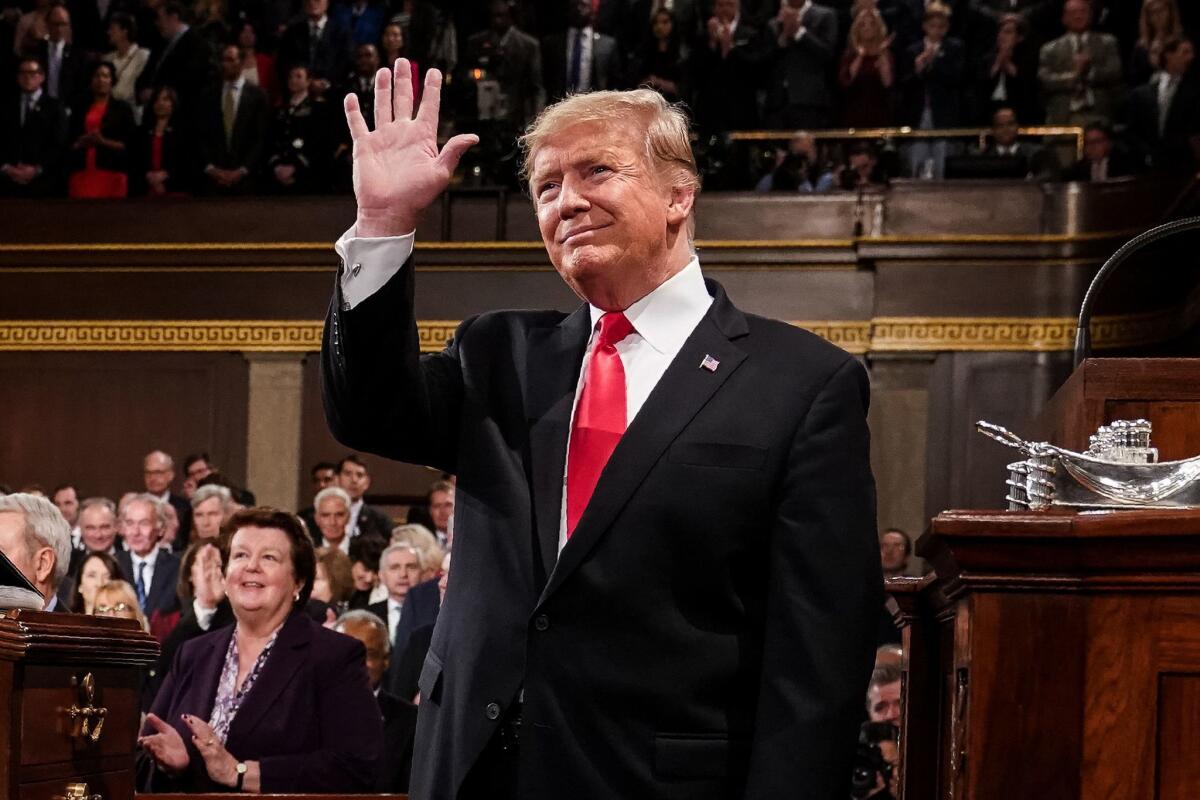Column: In foreign policy, Trump takes a premature victory lap

President Trump took an early victory lap for his “America First” diplomacy Tuesday, claiming a series of big wins on his foreign policy priorities.
Some of his claims were true — in a few cases, even careful and precise. Others were premature. Some were exaggerated; others incomplete.
But taken together, the foreign policy sections of Trump’s State of the Union address sounded more like a campaign speech than a detailed explanation of American diplomacy.
Some presidents have used the State of the Union to build a public case for going to war — George W. Bush before the 2003 invasion of Iraq, for example. Others tried to convey nuanced messages for their diplomatic priorities; Barack Obama’s professorial speeches come to mind.
Not Trump. His themes are familiar to anyone who followed the 2016 campaign: a strong America with a strong military, unafraid to throw its weight around — but also determined to bring U.S. troops back from “endless wars.”
The president even noted that he had “campaigned on the same core promises,” including a foreign policy that “puts America’s interests first.” Every one of his predecessors would say he too put America’s interests first, but this president suggests — and perhaps believes — that the principle is his alone.
Even some critics of Trump’s foreign policy acknowledge he’s scored some accomplishments and launched potentially promising negotiations without stumbling into a major crisis.
But he hasn’t persuaded most voters that his impulsive, bull-in-a-china shop style deserves admiration.
A CNN poll this month found that voters give Trump his highest marks on managing the economy, which has been surging: an approval rating of 48%. But on foreign policy, his approval rating was an anemic 40%.
A more detailed survey by the Chicago Council on Global Affairs found that most Americans disagree with some of Trump’s core foreign policy views. That survey found that 68% disagreed with Trump’s decision to withdraw from the Paris agreement on climate change, and 66% disagreed with his decision to walk away from Obama’s nuclear deal with Iran.
Foreign policy is unlikely to be the top issue in the 2020 campaign. Still, it’s what some political strategists call a “threshold issue”; voters want a presidential candidate to display at least basic competence in international affairs. And they judge an incumbent president on his achievements and mistakes.
Tuesday night gave Trump a chance to make the case for his success, and to set out what aides described as his “vision.” Anyone who studied the text for substance found plenty of case-making but little nuance.
Trump congratulated himself for moving the U.S. Embassy in Israel to Jerusalem. But he never mentioned his larger goal of forging a peace agreement between Israel and the Palestinians, a project he once pronounced “not as difficult as people have thought.”
He boasted that after withdrawing from Obama’s nuclear deal with Iran, he had ordered “the toughest sanctions ever imposed on Iran.” But he didn’t suggest how or when the sanctions, which have hurt Iran’s economy, would lead to his ostensible goal, a new round of nuclear negotiations or a collapse of the regime in Tehran.
If there was a centerpiece, it was Trump’s declaration of victory in the wars in Iraq, Syria and Afghanistan, and his reaffirmation that he will bring U.S. troops home as soon as possible — despite the qualms of many of his own aides.
He said Americans have been “fighting in the Middle East for almost 19 years” (actually almost 18) and that the United States has spent more than $7 trillion on those wars (a vastly inflated estimate.)
His determination to get the troops out quickly raises an unusual political problem: Leaders in both parties disagree with it.
Last week, the Senate passed a resolution warning against a “precipitous withdrawal” from either Syria or Afghanistan, saying it “could put at risk hard-won gains and U.S. national security.” The measure passed by a bipartisan vote of 68 to 23. Its author was none other than Mitch McConnell, the Senate majority leader.
Likewise, Republicans have pushed back whenever Trump suggests softening sanctions on Russia or questions the U.S. commitment to the NATO military alliance. But he has stuck to those positions.
The good political news for the president is that foreign policy divides the Democrats and independents too. Sen. Bernie Sanders (I-Vt.), who caucuses with the Democrats, voted against McConnell’s resolution, saying it sounded like an endorsement of the status quo — even if it put Sanders, for a moment, on the same side as the president.
A sober report card for Trump’s foreign policy, unsurprisingly, would yield a list of incompletes.
The troops aren’t home yet. Negotiations with North Korea haven’t borne lasting fruit; nor have the sanctions on Iran. The Middle East peace talks have gone nowhere. And trade talks have not yet produced their promised benefits for the American worker.
This is only the two-year mark; Trump has time to do more. But in Tuesday’s speech, he achieved one practical goal: He laid out the foreign policy themes of his 2020 campaign.
More to Read
Get the L.A. Times Politics newsletter
Deeply reported insights into legislation, politics and policy from Sacramento, Washington and beyond. In your inbox three times per week.
You may occasionally receive promotional content from the Los Angeles Times.






